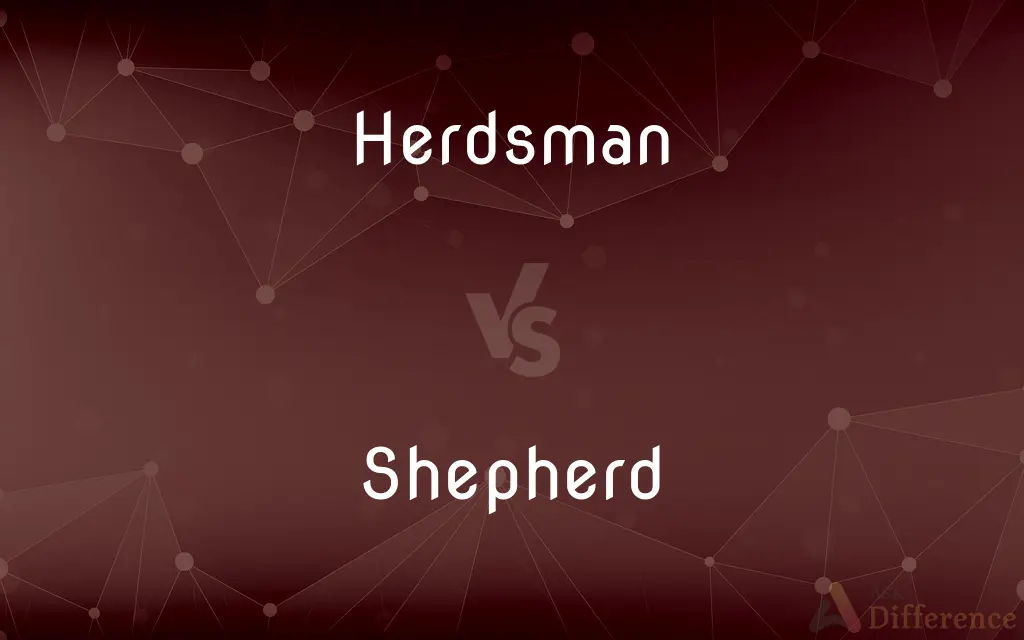Herdsman vs. Shepherd — What's the Difference?
Edited by Tayyaba Rehman — By Maham Liaqat — Updated on April 8, 2024
A herdsman tends to a variety of livestock, focusing on their overall management, whereas a shepherd specifically cares for sheep, guiding and protecting them.

Difference Between Herdsman and Shepherd
Table of Contents
ADVERTISEMENT
Key Differences
Herdsman is a term that broadly refers to individuals who manage, care for, and oversee the well-being of various types of livestock, including cattle, goats, and sheep. These individuals are often involved in the feeding, breeding, and medical care of the animals under their charge. On the other hand, a shepherd is specifically focused on the care and management of sheep. The role of a shepherd is deeply rooted in history, symbolizing guidance and protection, with a primary focus on ensuring the safety and nutritional needs of sheep.
While a herdsman's responsibilities can vary greatly depending on the types of animals and the specific needs of the herd, they generally have a broad skill set that applies to multiple species of livestock. Shepherds, however, are specialized in their knowledge of sheep behavior, health issues, and dietary requirements, making their expertise highly focused on a single species.
The tools and techniques used by a herdsman may include a variety of equipment for herding, milking, and healthcare, reflecting the diverse nature of their work. Shepherds, in contrast, often use specialized tools such as sheepdogs for herding, staffs for guidance, and shears for wool harvesting, emphasizing their specialized role.
Herdsman often work in varied environments, from large-scale agricultural operations to extensive rangelands, adapting their methods to suit the terrain and the specific animals they manage. Shepherds typically work in pastures or open fields where sheep graze, often moving with their flock to ensure access to fresh pasture, highlighting the nomadic aspect of their role.
In cultural and historical contexts, herdsmen have been portrayed in various ways, sometimes as nomadic caretakers of large herds, reflecting their adaptability and versatility. Shepherds, by contrast, are often depicted with a pastoral ideal, symbolizing care, guidance, and the pastoral life, underscoring their specialized and nurturing relationship with sheep.
ADVERTISEMENT
Comparison Chart
Focus
Manages a variety of livestock
Specifically cares for sheep
Skills
Broad skill set for multiple species
Specialized knowledge of sheep
Tools
Varied equipment for different livestock
Sheepdogs, staffs, shears for sheep
Environment
Agricultural operations, rangelands
Pastures, fields for grazing
Cultural Symbolism
Versatility and adaptability
Care, guidance, pastoral life
Compare with Definitions
Herdsman
A person responsible for the care and management of a herd of livestock.
The herdsman efficiently managed the diverse needs of his cattle and goats.
Shepherd
A person who tends, feeds, and guards sheep.
The shepherd led his flock to a new pasture for grazing.
Herdsman
May operate in diverse environments.
The experienced herdsman adapted his strategies to the mountainous terrain.
Shepherd
Symbolizes guidance and protection.
The shepherd’s role in the community was valued for his guidance and protective instincts.
Herdsman
An expert in the breeding and health care of animals.
The herdsman introduced new breeding techniques to improve the herd's health.
Shepherd
Often nomadic, moving with the flock.
The shepherd moved his flock seasonally to access fresh pastures.
Herdsman
Often works with a variety of animals.
As a herdsman, he has to be knowledgeable about both sheep and cattle.
Shepherd
Uses dogs and staffs to manage and protect sheep.
The shepherd and his dog worked in unison to herd the sheep.
Herdsman
Utilizes a range of tools for livestock care.
The herdsman’s toolkit included everything from milking machines to veterinary supplies.
Shepherd
Specializes in sheep behavior and care.
The shepherd recognized the signs of illness in the flock immediately.
Herdsman
A man who herds, tends, or manages livestock.
Shepherd
A shepherd or sheepherder is a person who tends, herds, feeds, or guards herds of sheep. Shepherd derives from Old English sceaphierde (sceap 'sheep' + hierde 'herder').
Herdsman
A person who tends livestock, especially cows and sheep.
Shepherd
A person who tends and rears sheep.
Herdsman
Someone who drives a herd
Shepherd
Tend (sheep) as a shepherd.
Shepherd
Guide or direct in a particular direction
I shepherded them through the door
Shepherd
One who herds, guards, and tends sheep.
Shepherd
One who cares for and guides a group of people, as a minister or teacher.
Shepherd
A German shepherd.
Shepherd
To herd or tend as a shepherd.
Shepherd
To guide or lead on a course
The counselors shepherded the campers toward the waterfront.
Shepherd
To direct or instruct in a certain manner
Shepherded the student through algebra.
Shepherd
A person who tends sheep, especially a grazing flock.
Shepherdess (f.)
Shepherd
A male sheep tender
Shepherdess (f.)
Shepherd
(figurative) Someone who watches over, looks after, or guides somebody.
Shepherdess (f.)
Shepherd
A male watcher/guardian/guider/leader
Shepherdess (f.)
Shepherd
(figurative) The pastor of a church; one who guides others in religion.
Shepherdess (f.)
Shepherd
A male pastor
Shepherdess (f.)
Shepherd
(poetic) A swain; a rustic male lover.
Shepherd
A German Shepherd.
Shepherd
(transitive) To watch over; to guide.
Shepherd
To obstruct an opponent from getting to the ball, either when a teammate has it or is going for it, or if the ball is about to bounce through the goal or out of bounds.
Shepherd
A man employed in tending, feeding, and guarding sheep, esp. a flock grazing at large.
Shepherd
The pastor of a church; one with the religious guidance of others.
Shepherd
To tend as a shepherd; to guard, herd, lead, or drive, as a shepherd.
White, fleecy clouds . . .
Shepherded by the slow, unwilling wind.
Shepherd
A clergyman who watches over a group of people
Shepherd
A herder of sheep (on an open range); someone who keeps the sheep together in a flock
Shepherd
Watch over like a shepherd, as a teacher of her pupils
Shepherd
Tend as a shepherd, as of sheep or goats
Common Curiosities
What is the main difference between a herdsman and a shepherd?
A herdsman manages various types of livestock, while a shepherd specifically cares for sheep.
Do shepherds always use sheepdogs?
While not always, sheepdogs are commonly used by shepherds for herding and managing sheep.
Are the tools used by a herdsman and a shepherd the same?
No, herdsmen use a variety of tools for different animals, while shepherds use specialized tools for sheep.
Is being a shepherd limited to certain environments?
Shepherds typically work in pastures or fields suitable for sheep grazing.
How does a shepherd learn their trade?
Through experience, mentorship, and sometimes formal education focused on sheep care.
Why is the shepherd often symbolized with guidance?
Because of their role in leading and protecting sheep, similar to guiding and caring for a community.
Can women be herdsmen or shepherds?
Yes, women can and do work as both herdsmen and shepherds.
How has technology impacted the work of shepherds?
Technology such as GPS tracking and drone monitoring has enhanced the efficiency and safety of shepherding.
Can a herdsman take care of sheep?
Yes, a herdsman can take care of sheep among other livestock.
How do shepherds contribute to agriculture?
By managing sheep for wool, meat, and sometimes milk, contributing to the agricultural economy.
What cultural significance do herdsmen have?
Herdsmen are often associated with pastoralism and nomadic cultures, reflecting adaptability and a connection to nature.
What skills are important for a herdsman?
Broad knowledge of animal care, breeding, and management for various livestock.
Are all herdsmen nomadic?
Not all, but some herdsmen adopt a nomadic lifestyle depending on the livestock and terrain.
What challenges do herdsmen face?
Challenges include managing diverse animal needs, climate change, and shifting agricultural practices.
Is the lifestyle of a herdsman similar worldwide?
While there are commonalities, the lifestyle can vary greatly depending on regional practices and environmental conditions.
Share Your Discovery

Previous Comparison
Viewing vs. Watching
Next Comparison
Make vs. PerformAuthor Spotlight
Written by
Maham LiaqatEdited by
Tayyaba RehmanTayyaba Rehman is a distinguished writer, currently serving as a primary contributor to askdifference.com. As a researcher in semantics and etymology, Tayyaba's passion for the complexity of languages and their distinctions has found a perfect home on the platform. Tayyaba delves into the intricacies of language, distinguishing between commonly confused words and phrases, thereby providing clarity for readers worldwide.














































